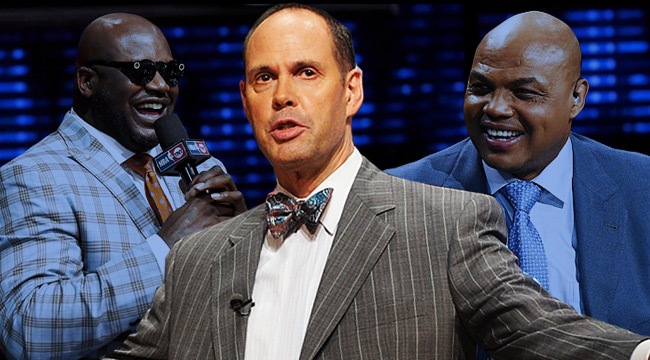
Ernie Johnson is the ringmaster for sports television’s greatest circus, Inside the NBA. Each week, Johnson hosts the show and does his best to keep Shaquille O’Neal, Charles Barkley and Kenny Smith on track during the pre-game, halftime and post-game shows.
Johnson’s role is to toe the line between letting the analysts go off on entertaining tangents and arguments — and as he tells us, sometimes actively inciting those incidents — while also hitting his beats for promotional reads, highlights and commercial breaks. It’s a job very few could succeed at, and one no one could do quite as well as Johnson — who even fails at times to hold it together during the absurdity.
While Inside the NBA is his home base, Johnson wears many hats as a host and play-by-play announcer for Turner Sports. For the past month, Johnson has been hosting the studio show for Turner and CBS Sports’ coverage of the NCAA Tournament and this weekend he will host pregame coverage for the Final Four and National Title game from Phoenix.
Johnson spoke with Dime Magazine about the upcoming Final Four, preparing for the tournament during the NBA season, putting Chuck and Kenny in the right spots to succeed, having to tell Shaq to chill out on forcing jokes when he joined Inside the NBA, his favorite unexpected moments from the show, how he learned never to tell Charles Barkley not to do something and what he hopes people get out of his upcoming autobiography Unscripted, which he’ll be signing copies of at the NBA Store on Fifth Avenue in New York on April 4 from 2-3pm ET.
This tends to be a slow period for NBA talking points, is it nice to get a little break from the NBA during the tournament before going back for the final stretch run and playoffs?
It’s interesting that you would bring that up, because I was up till about 2 a.m. last night, and I was just catching up on the last four days of the NBA season. I’ve been able to keep up pretty well, because I never just put the NBA away when I’m doing March Madness because I keep a daily log of every game that’s played during the season, and I keep separate files on 30-point games, triple-doubles, winning streaks, losing streaks, overtimes and all that stuff.
So I have this system down that I use every day to keep up with the NBA, but during the tournament, sometimes I’ll let a few days lapse because I’m not on the air. I’ll say, “OK, well I’ll catch up to those.” So, last night I was catching up with all the box [scores] of the last four days and updating all of my stuff. So, yeah, it’s nice not having to worry about doing a show about the NBA while I’m doing March Madness, but as far as paying attention to it, I’m totally up to the second right now. It’s a good feeling. At 2 o’clock in the morning last night I was like, “good, got that done,” and now another week starts and it’ll be two weeks from [Monday] that I’ll be back in the studio.
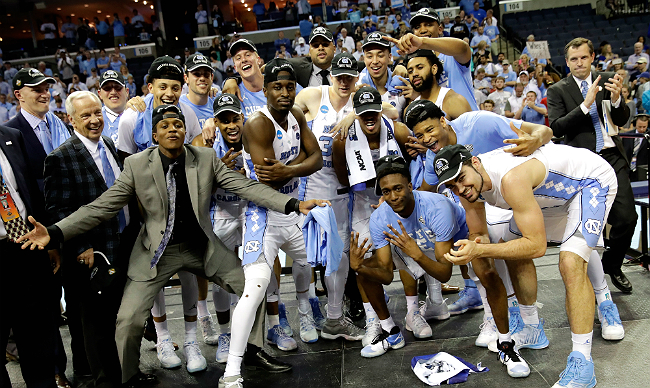
What are the biggest difficulties in switching gears from NBA stuff to tournament stuff, and how much do you, Kenny and Chuck work together so you all can hit the ground running once the tournament starts?
Well, it’s not like we all have a plan together for how we prepare for March Madness, but we all have our own ways of getting involved and getting up to speed on it. And a lot of that comes from our researchers Joe Underhill and Hal Gaalema, who will a couple of times put out some thumbnails going, “hey, here are some teams to keep an eye on and here are some players to keep an eye on,” back in January and that kind of thing. So you find yourself watching more and more college hoops as the season goes on.
When the NBA season starts in late October and early November, you’re pretty much exclusively watching that until teams get out of their non-conference schedules and then you start paying more attention. We all have different ways that we ramp up and then by the time the Selection Sunday rolls around you’ve got a pretty good handle. I’ve probably got files that I’ve built on 200 teams over the last, this is our seventh year — in fact I counted them up the other day and I’ve got 216 team files that I had built from scratch going back to when we first started doing this. So, every year I update those and you might see a team in there you haven’t paid attention to for four years cause they haven’t been there, but then you’re updating every year the Kansas’ and the North Carolina’s and that’s kind of the way I do it.
And then you’re in touch with the folks at CBS because they’re always putting out information on matchups to watch tonight in January and February and then you go through those and you look at the players they’re talking about and you watch more games. I’m sitting here in my home office a lot of nights where I’m working on NBA stuff and I’ll say, “Oregon’s playing tonight, I’ll watch that.” So, we all have our different ways of preparing for it, and when it really gets down to it, we’re talking basketball. And there’s nobody I’d rather talk basketball with than Kenny and Chuck, and throw Clark Kellogg in there who’s immersed in the college game all year and I think it’s a really good mix.
That’s something I wanted to ask you about is the dynamic on set when you’re playing the host role and steering conversation, is there a formula you have in choosing what topics you’ll ask Chuck about, who isn’t as immersed in college hoops as Clark or as much of an X’s and O’s guy as Kenny. How do you balance what you bounce to Chuck, Kenny and Clark as you’re previewing or recapping a game?
I think it’s the same as when I’m doing the NBA, and we’ve been doing that for so long, it’s that my role is to get the ball to these guys in the places they can excel. So I want to get it to Charles in the low block and let him go to work. I want to get it to Kenny for a wide open three.
And, so, what that translates into is where are these guys really strong. OK, here comes a game that features great guard play, so I’m going to go to Kenny first cause I know he loves to talk about that. Then I’m going to go to Chuck here because I know he loves to talk about a team that needs to prove itself, so I’m going to do that. I’m not always going to, early in the tournament, go to specific players, but as the tournament goes on you feel much more comfortable doing that. Because all of us, as the tournament goes on, have a better feel for who these players are. So, you have no problem going to Chuckster about Sindarius Thornwell.
I think sometimes when you start the tournament, you try not to be real specific teamwise. Especially if you have a 14-seed playing a three in the first round, you’re not going to say, “Hey, how about the backup point guard for this 14-seed, Chuck?” because you’re going to get a blank stare. And I’m going to give him a blank stare back because I don’t know who it is either [laughs].
You know, the whole goal at that point is you may not have everything ingrained into your memory and into your brain like we do for the NBA, but you know how to get your hands on it. And you know how you can refer to it, and a lot of times that’s the biggest thing for me, knowing where I can get my hands on that kind of information and have it there at a moment’s notice. No, as the tournament wears on, these guys have seen these teams three or four times and have developed a pretty good opinion of what the players do, what the teams do and what the coaches do, and you’re just talking hoop.
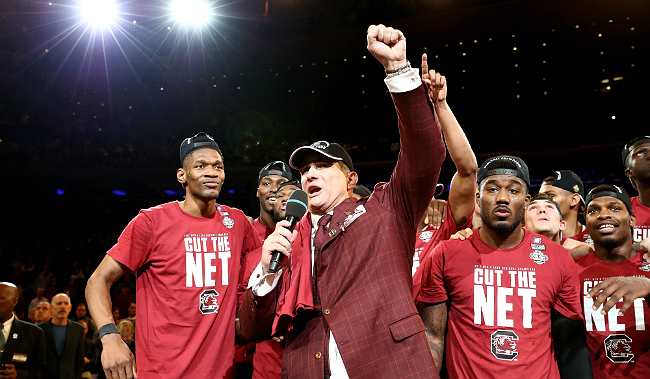
For the Final Four broadcasts you’re going to get a lot of casual viewers and people that may not have been able to be plugged in for the whole tournament, and in this year’s Final Four as much as I can remember in recent history you have, outside of North Carolina, three teams that aren’t necessarily going to be household names. How does that affect how you preview these games compared to other years, and will there be more of an introductory “here’s what to know about these teams” than maybe usual?
Sure, I think you owe that to the fans that aren’t around it. And I feel that way no matter what sport I’m doing when it gets down to playoff time. Whether it’s NBA or Major League Baseball or whatever, you can’t assume that anybody has watched the games or watched the league as much as you have. And I think, especially for March Madness, it attracts such a large number of fringe sports fans. Those who are just people in the office pool who some of them don’t know if the ball’s blown up or stuffed, but suddenly they care about South Dakota State.
So, it’s like, I think it’s always a good thing, no matter what sport you’re doing to provide some kind of texture for this that gives somebody a reason to root for somebody. Whether that’s introducing them to a certain player or a certain coach or a certain program that makes them say, “Hey, that’s a good story I’m for those guys. I like that guy. I like that coach. I hope he wins.” So, I think you have to do that, and by this point going to the Final Four, I don’t know how many more fans are going to join the party.
Most of those I think have already gotten in on the madness as is, but yeah, you certainly feel like I have to point out that this South Carolina team went 44 years without winning a game in the tournament and now look at all these barriers they’ve broken down, going to the Elite Eight and here they are in the Final Four. It’s a great story. It’s a great underdog story, and with a team like Oregon when you say they won the thing when the first time they played it and they haven’t been back to the Final Four since. There’s a great story there.
Obviously with the success Mark Few has had at Gonzaga and finally able to get here — which I’m happy to see, because I think it’s validation on what’s already been a great career, but people hang that tag on you saying, “But when can he win the big one? And then you have North Carolina [laughs]. If anybody needs an introductory course on North Carolina, then obviously they haven’t been watching much hoop. For the other three, there’s going to have to be a getting to know you process and letting folks know how cool this is for those three teams to be standing where they’re standing in Phoenix.
All the mic flags this year have Sager Strong on them and you had the incredible moment on All-Star Saturday night back in February. I think we all knew Craig was someone that meant a lot to the basketball community, but have you been surprised at all at how much support the Sager Strong movement has gotten and how meaningful has it been to see so much support?
No, I’m not surprised at all. I think, as we saw him fighting through that whole leukemia thing for two and a half years, the way you saw the league reach out and fans reach out and teams reach out, you knew that they’d totally be behind Sager Strong. We were all touched by it and we were all inspired by it, and there’s a part of me, I was so happy that Craig was around to see the Cubs win it, because he had been such a Cubs fan all of his life. To watch them win the World Series, and then to see Northwestern, where he was the mascot, to see Northwestern make the tournament for the first time, yeah, it makes you feel like the Sager Strong thing goes beyond just the surface. And to see our sideline reporters and they’re using the Sager Strong mic flag and it just gives us kind of a touch point to remember our friend and that inspiration that he provided won’t ever be forgotten.
What’s your favorite Sager memory?
I think probably that suit he wore in the All-Star game in New York in ‘98 and the league told him to take it off, change. It looked like it was made out of eel skin or something, and the league suggested, “Hey, let’s tone that down a little bit.”
No, there are so many. Craig had such a great way of lighting up a room. It was crazy, cause you’d be coming in from a dinner one night, and Sages would be going out and you’d say, “OK, he’ll be in for a long night.” Then you’d be getting up in the morning and getting a cup of coffee and here Sages is back in from running five miles. I don’t know if he ever slept! He just got a tremendous amount of joy out of his job and being on the sidelines, which made it that much better to have him be able to return and do some work as he was continuing that fight.
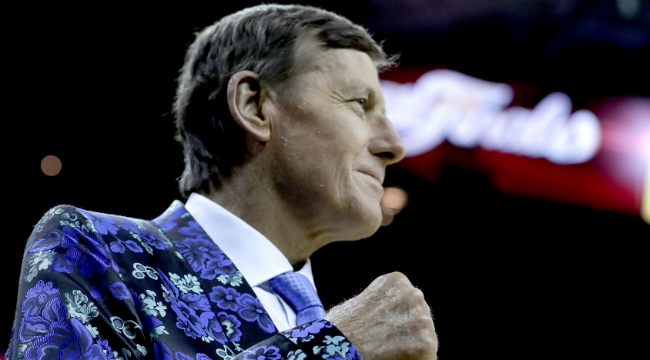
I do have to ask someInside the NBA questions. It seems like now you’ve gotten, as much as you can, a pretty good handle on how to keep the show rolling when Chuck and Shaq start rambling on or getting off course, but when Shaq first came on, what was the process of learning to handle both of those personalities on set?
Well, the one thing I had a conversation with Shaq about early on was — cause I know Shaq joined the show and he’d seen it the air for a long time and he knew what kind of fun we had — and I think he was kind of looking for that moment every time we were on the air. It was like, “Hey, if we do this gag it’ll be really funny,” and “if we do this it’ll really be funny,” and a lot of times we just let that stuff come to us and something organically would be funny. So that first year, we had a conversation once in my office.
I said, “Hey, I think this’ll help you. You’re doing great. You’re having a good time, but let me just throw this at you. When you were playing and you were watching our show and you’d see Charles do some outrageous stuff or we’d be laughing, the thing that Chuck always does — even amidst all the fun and the opinions and all that stuff — is he always comes in with about four or five things that he wants to get out on the air that night at some point. Something about the league. Something about a player. He has something he wants to say.”
So, I told him, “Come into the studio with that same kind of vibe. Come in with a handful of things you want to talk about, we’ll have fun along the way. Things will happen along the way that we’ll be yuckin’ about and things will be fun, but Chuck always comes in with that. So have something in your saddlebags there that you want to talk about. Whether it’s how a guy’s playing or if you suddenly like a team. Have that.”
And that’s really the only conversation. Chuck and Kenny and I used to joke with Shaq early on, because he was always wanting to do the next gag and that kind of thing, we said, “You’re going to want to set yourself on fire the next show! You keep feeling like you’ve got to one up yourself the next week.” And he says [Ernie does his best Shaq impression], “Go ahead, I’ll set myself on fire. I’ve been to stunt school.” So, I think that’s the only thing that’s been on the learning curve. Other than that, he’s adapted immediately to the way we do things on that show.
What’s the most shocking or unexpected thing that’s happened on the show that sticks out to you?
Oh, that’s so hard. Well, I mean probably one of those things was Shaq, when he was trying to race Kenny to the board, got his leg wrapped up in the cable and ripped a monitor right out of the set and then people had all those memes online of epic falls and here was Shaq. That was one of those things.
Down Goes @Shaq! http://t.co/1mjrZZ8QgC
— NBA on TNT (@NBAonTNT) May 7, 2015
Another shocking thing was when we did the Golden State highlights one night, and I’m trying to voiceover the Golden State highlights live and I say, “Here we are in Oakland,” and [Shaq] says [Again going into his Shaq impression], “Hey, how come you keep saying Oakland?” And I say, “Cause that’s where they’re playing the game.” “I didn’t know that. I thought they played in San Francisco.”
You can’t script that! You can’t. And that’s one of those organic moments that becomes something everybody’s talking about the next day around the water cooler. That wasn’t anything anybody planned. You can’t come into a meeting and say, “Hey, how about if Shaq doesn’t really realize that Golden State plays in Oakland and what can we do there?” I mean, that’s just one of those things that comes up and we just killed him for it the rest of the night.
https://www.youtube.com/watch?v=Z9uLtEWHMqM
So, things unexpected are happening all the time, and that’s what makes the show fun. Because it is unrehearsed and it is spontaneous and off the cuff and let ‘er rip and all those cliches. If it weren’t, it wouldn’t be the same show. If this were one of those things where we rehearsed a segment three times and then did it live, it comes off as so bogus. Because you can tell. The shows that are rehearsed you can tell, because, bang, everybody hits as soon as somebody’s done talking, another guy hits and then he talks and he talks.
Here, it’s just mayhem. Sometimes if you talk the loudest you get heard, but that’s what we want. We want the genuine gut-level reactions. We want someone to see something and want to be the first one to talk about it, because it strikes a chord with them. So if they have to fight for who talks first, then OK. That’s kind of the way we do it.
Part of that whole thing is knowing your role. I go back to that. I’ve got to get us on the show from Point A to Point B to Point C, but I’ve also got to get these guys where I think I can push a button to get them to go. People call that a traffic cop or a point guard or whatever, but I think it’s kind of a rogue traffic cop if you will. Real traffic cops don’t want any fender benders in the intersection. They want to wave this guy in while this guy stops. In my role, I’m kind of like, I’m waving Kenny through the intersection knowing Shaq’s going to come through and broadside him.
How hard is it to hold it together when they are going off on tangents and cracking jokes? Sometimes you just can’t help but laugh when they’re going on…
Oh, come on, that’s what we do! Again, nobody’s rehearsed this thing. It’s unscripted. There’s going to be times where somebody says something and it’s just like you’re in the living room, you just start laughing. And then the problem is, sometimes if you’ve got to straighten up and get to the next thing. I can’t remember what I was laughing about so hard the last time, but I had a lead-in to do to the next highlight and I just told the director, “Just move on, roll the next highlight, I’m not going to read this thing.”
I think that was when everyone was joking about paying for a Lakers-Bucks game…
Yeah! It was the $6.99 thing and, yeah, we were all having a great time and then I knew I had this 20 second lead to the next highlight and I said, “To heck with this, we don’t need it.” Because if I had tried to read this thing while these guys are laughing, it never would’ve worked [laughs].
Charles Barkley clowns NBA League Pass for offering $6.99 single game price for Lakers at Bucks pic.twitter.com/IIQRlUhopS
— Gifdsports (@gifdsports) February 10, 2017
With a moment like that, have you ever been like, “Oh, we’re going to get a call from the league”?
You know what, what are you going to do? You can’t reel it back at that point, or try to apologize. Look, we were doing what we were told. We were promoting this League Pass $6.99 and they say, “you can watch…,” are you telling me there’s not a better game we can promote than Bucks-Lakers? [laughs] Come on. Hard-working America’s gotta know where that $6.99 is going and it ain’t going there. Come on. So that’s [laughs] that’s what was funny.
Most of the time I read through what we’re going to do before the show, but that one was one of those, “What are we doing next?” Oh, we’ve got the League Pass promo and then we go into your highlight. OK. And I’m thinking, “How difficult could this be? We do it a thousand times.” And even as I was reading it, “For $6.99, this week the Lakers…” and as I was saying it, out of the corner of my eye I could see Chuck’s jaw dropping and I knew he was going to say something.
[Goes into his best Barkley voice] “Really? 6.99 to watch that?!” And then it was on. So, that’s just one of those things where the fans relate. I think the fans at home are watching and I would’ve had the same reaction. So, yeah, sometimes we don’t get directly called to the principal’s office, but we hear from the principal’s office. “Hey, sales didn’t appreciate that,” or, “Marketing thinks we could’ve handled that better.”
We all know that, but, hey, early on in the show like the first year we used to promote what was coming on TNT after the show and it was always a movie. And I would promote it, “Hey, next on TNT…” and Chuck routinely was saying, “That movie’s terrible. I wouldn’t watch that if you paid me.”
So, the folks at TNT were getting upset. They were like, come on, Charles can’t be killing the movies we’re trying to promote. So, our producer Tim Kiely had to have a talk with Charles going, “Hey look, cool it on that thing. We’re trying to get people to watch and it’s part of promotion. When you tear it down it’s not promoting it.”
The next night we’re on and I go, “Hey, coming up next on TNT is so-and-so,” and Chuck says, “I’ve been told that if I don’t have anything good to say about a movie I can’t say anything, so I’m gonna shut up.” I think sometimes you learn if you draw a line in the sand with Chuck he’s going to cross it at the next opportunity.
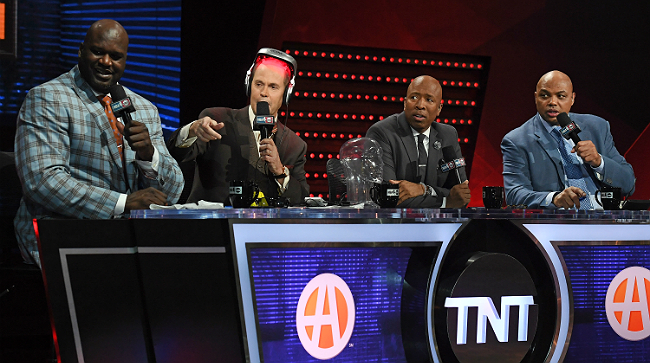
Finally, you’ve got your autobiography coming out. What was the inspiration to do that and what are you hoping people get out of reading that?
You know, in my life, we’ve had a lot of stuff. We’ve had six kids and adopted four of them — one from Romania, one from Paraguay, a couple from foster care in Cleveland — and had a battle with cancer back in 2003 and treatment in ‘06. My father and I had this wonderful relationship before he passed, and so, kind of all of that was addressed when ESPN’s E:60 unit did about a 25-minute feature on our family back in ‘15. The response continues to be staggering to me. Every time it’s replayed or every time someone sees it for the first time online, my Twitter blows up, especially when it first hit. And really for the last few years it’s been steady. I had always wanted to write a book and this was kind of the spark to say, this is the time to get into it.
So, yeah, I think sports is just a backdrop in this. It’s what I was doing in my career at the time, but it’s more about those things that matter. It’s more about family and adoption and raising a special needs child. Things I learned from my dad that I’m trying to pass along to my kids, and how faith plays a role in all of that. So, it’s one of those things.
It’s deeply personal, and I would hope there’s something to take away for folks on a lot of different levels. Whether it’s having to deal with a cancer diagnosis or considering adoption, going through life with a special needs child. There’s a lot of different levels. So in that book, which is called Unscripted, I haven’t laid out a how-to, but just said here’s how we’ve navigated this journey. Not telling you you have to do it this way, but just saying this is how we’ve done it.
And so it was really an adventure to write it, and I’m proud to say I wrote every word. I wasn’t going to get a ghostwriter and tell my story to somebody, I just wanted it to be straight from my heart. We’re very excited, it’s coming out Tuesday after the championship game on April 4th and it’s such a cool thing to have done.
I was talking to Seth Davis the other day, who’s written books, and I had given him a copy of it and he said, “Doesn’t it feel great when you hold this thing in your hand and you know you put this together?” And I told him it did and it’s a real point of pride. But I think it can speak to a lot of folks on a lot of different levels right where they live right now. We’ll put it out there and I hope that it’ll help somebody — I’m not trying to give them a glimpse into my life, so much as give them a glimpse into their own just by looking at their own lives and saying here’s a person who’s been through this too.






